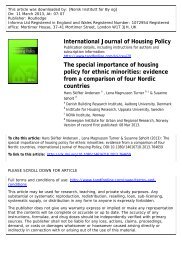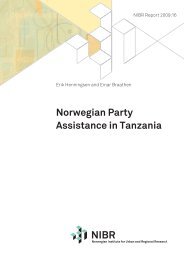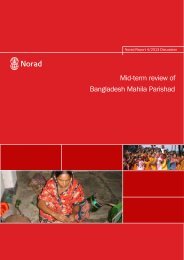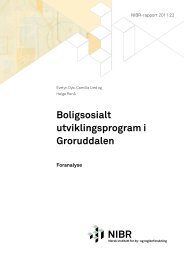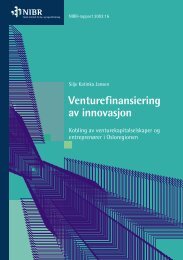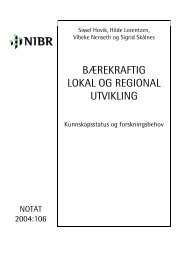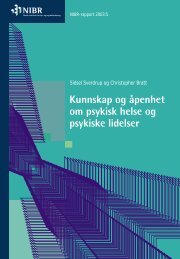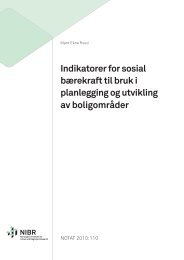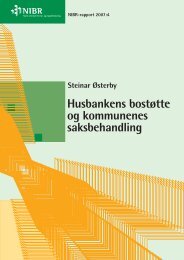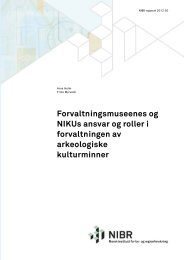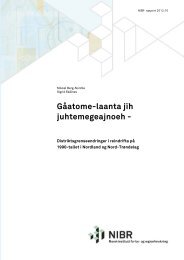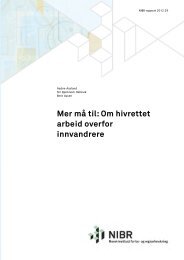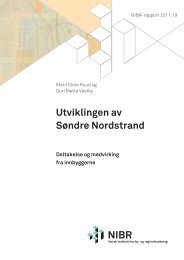Evaluation of the Southern and Eastern Africa Regional Centre for ...
Evaluation of the Southern and Eastern Africa Regional Centre for ...
Evaluation of the Southern and Eastern Africa Regional Centre for ...
- No tags were found...
You also want an ePaper? Increase the reach of your titles
YUMPU automatically turns print PDFs into web optimized ePapers that Google loves.
34“massive knowledge. It has really helped us. The general value is capacity building; <strong>the</strong>ycan always use it to transfer in<strong>for</strong>mation that <strong>the</strong>y acquired to o<strong>the</strong>r <strong>of</strong>ficers. They areacting as models, so some o<strong>the</strong>r <strong>of</strong>ficers admire <strong>the</strong>m, especially <strong>the</strong> men”. Mr. Kasale,(Head <strong>of</strong> National Victim Support Unit, Zambia).An additional example <strong>of</strong> impact <strong>of</strong> <strong>the</strong> graduates is <strong>the</strong> training <strong>the</strong>y have given toexisting police <strong>of</strong>ficers in various regions in Zambia on women <strong>and</strong> gender issues,which includes domestic violence.Fur<strong>the</strong>rmore, ano<strong>the</strong>r example <strong>of</strong> what <strong>the</strong> graduates have done is <strong>the</strong> nationaleducation campaign on drug en<strong>for</strong>cement, <strong>and</strong> interventions have been made toreach out to <strong>the</strong> women being used as drug traffickers. The police have alsoestablished a programme <strong>and</strong> network among men concerning gender based violence<strong>and</strong> graduates have been involved in this work. These networks exist at differentlevels, some even at <strong>the</strong> village level.The graduates are in <strong>the</strong> different provinces <strong>and</strong> <strong>the</strong>y have trained o<strong>the</strong>rs at that level.The number <strong>of</strong> reported cases <strong>of</strong> gender based violence has increased in recent yearsin Zambia, but <strong>the</strong>re are still challenges in terms <strong>of</strong> many cases being withdrawn. Insum, <strong>the</strong>re are several achievements within <strong>the</strong> police <strong>and</strong> <strong>the</strong> graduates have helpedin raising <strong>the</strong> awareness <strong>of</strong> women’s issues within <strong>the</strong> police (see also section onemployers).O<strong>the</strong>r sectorsINGOs <strong>and</strong> NGOsAn increased number <strong>of</strong> graduates have joined international agencies, includingintergovernmental organisations, as <strong>the</strong> survey demonstrates. In addition, several <strong>of</strong><strong>the</strong> graduates have done consultancies or o<strong>the</strong>r short-term engagements <strong>for</strong>international agencies. This had led to a more proactive evidence based approach inseveral organisations. The Director <strong>of</strong> one NGO, Musasa, explained how this addedcapacity meant that <strong>the</strong>y were no longer ‘just sitting <strong>the</strong>re but that we areunderst<strong>and</strong>ing, doing advocacy <strong>and</strong> research- in which evidence based work is nowvery important’. As one graduate in Zambia stated:“This is my second job after SEARCWL. Immediately after SEARCWL I joined <strong>the</strong> UNHCR. Therewere over 160 applicants <strong>for</strong> <strong>the</strong> job at UNHCR. I would not have applied if not <strong>for</strong> <strong>the</strong> course. Myself-esteem <strong>and</strong> self-confidence just went up after <strong>the</strong> course. The kind <strong>of</strong> job I was to do, we were toclose <strong>the</strong> camp in <strong>the</strong> Nor<strong>the</strong>rn part <strong>of</strong> Zambia, which had not been successful be<strong>for</strong>e <strong>and</strong> <strong>the</strong> refugeeswere to go back to <strong>the</strong> Congo. I applied <strong>the</strong> methodology learned at SEARCWL <strong>and</strong> I employeddifferent communication strategies in <strong>the</strong> camp as I learnt at SEARCWL. We managed to close <strong>the</strong>camp. The challenge <strong>of</strong> women refugees is one I want to bring up at <strong>the</strong> next session <strong>of</strong> parliament.The most vulnerable refugees are women”. Shadreck B<strong>and</strong>a (Deputy Director, National Legal AidClinic).Several graduates also pointed out <strong>the</strong> capacity added by <strong>the</strong> field work <strong>and</strong> researchmethodology component on <strong>the</strong> course. One described how, though she workedpreviously on research <strong>and</strong> advocacy on prisons that ‘I was writing on femaleprisoners but had never visited a cell!’ Following <strong>the</strong> course she felt equipped



